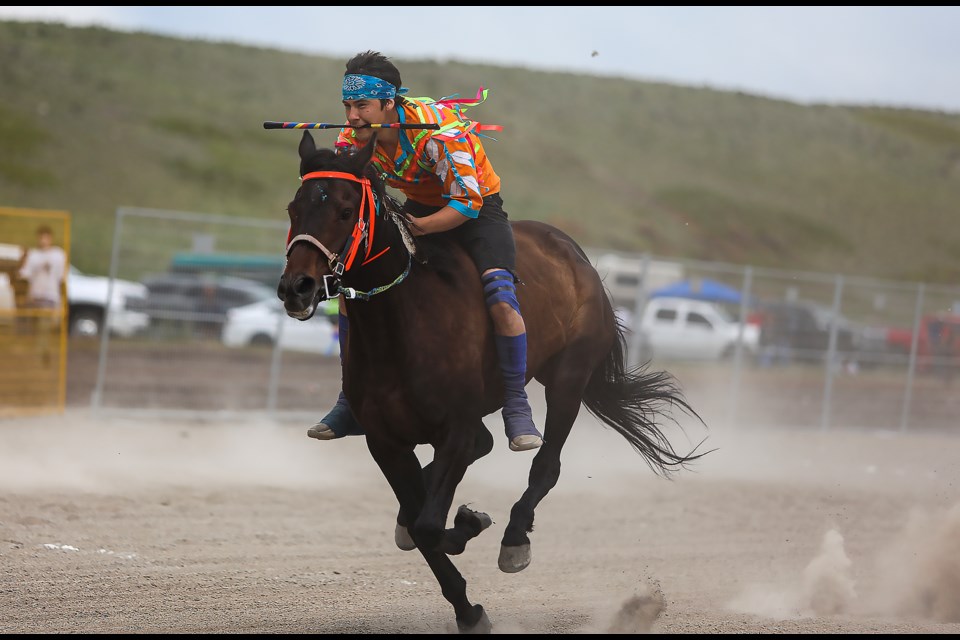ÎYÂRHE NAKODA – After the horn blows, there’s only one rule: lose your horse and you’re disqualified.
A Saddle Lake Cree Nation team learned that lesson the hard way, while a few others came close to losing their spirited steeds breaking in a new track some weren’t sure would be finished in time for the inaugural Mînî Thnî Indian Relay Race.
But the Nakoda Warriors, one of five Îyârhe Nakoda First Nation teams at the two-day event, left no doubt in the competition’s mind they were more than ready to show off on home soil.
“It means a lot to me, winning our own hometown show,” said Watson Kaquitts, who owns the Nakoda Warriors team. “We’ve been trying to get this race track built since 2018.”
The Warriors, comprised of rider Zane Jackson, backholder Ollin Benjamin, setter Jari Twoyoungmen and catcher Chad Poucette, were a fraction of a second faster than runner-up Majestic Starlight Relay’s 6:78.10 with a combined time of 6:77.78 over two days and two heats, sending the Onion Lake Cree Nation team back to Saskatchewan with the 2nd place bag of $6,500.
The unpredictability of Indian relay means it can be anyone’s race to win, said Benjamin. Upsets aren’t uncommon in the fast-paced sport which sees one bareback rider take three laps around a 0.8-kilometre track, leaping to a new horse in frantic, but skilled fashion at the start of each lap.
“It’s such an adrenaline rush. Things can really change in an instant,” said Benjamin. “You can be leading and have that advantage for most of the race, but it really all depends on the exchange.”
The Warriors, who had a three-second lead going into the third and final lap on their heat two competitors – Saddle Lake’s Arrowhead, which was disqualified from heat one – ended up losing the heat after it took Jackson 13 seconds to mount the team’s last thoroughbred in line during the exchange.
The horse, as they are trained to do in the event, was ready to run while Jackson was still trying to hop on. There are no saddles in Indian relay.
As a result, Arrowhead rider Keegan Shirt was able to take the lead, finishing the heat about four seconds faster than Jackson – who rode hard to close in on Shirt’s lead.
Jackson said he was pleased with the end result, despite the hiccup in heat two. Although the Warriors lost on the second day, they had the fastest race time of any team the entire weekend in their first go-around at 3:32.42, which gave them enough breathing room to still place first overall and win the top prize of $7,500.
“I was happy with how it went,” said Jackson. “And we had a really good turnout.”
Jackson and his teammates also competed with Kaquitts’ second team, Mînî Thnî Blue Feather, which had less luck on the track with a combined time of 7:62.64 and took home the 7th place prize.
Kaquitts said he prioritized his best horses to the Warriors, with some of his less well-trained horses competing with Blue Feather.
“I have an A team and I have a B team,” he said. “We did really well with the A team, but the B team was so-so because one horse isn’t yet familiar with relay. He’s a racehorse, but we haven’t had him on the track much for relay.”
Other teams competing at the event for Îyârhe Nakoda were North Star, which placed 3rd with a time of 6:82.94, Red Sky, which placed 5th at 6:93.19. Kaquitts Relay, which is owned by Watson’s nephew, Waylon, placed 6th with 7:42.34. River Cree, run out of Enoch Cree Nation, came in 4th at 6:84.78.
Sponsored cash prizes were handed out in the range of $3,000 to the 8th place team – Arrowhead – to $7,500 for the fastest team.
Kaquitts said the relay event, which was part of Îyârhe Nakoda Nation’s Canada Day rodeo festivities, is just the beginning.
“The next time we have it here, we’re gonna have way more people,” he said, adding there were four other Indian relay events scheduled the same weekend. “The people that came and supported this, really enjoyed it.”
The Nation’s relay committee is already planning to host another event August 12-13, where they’re aiming to have 20 teams compete.
“I think this track is really going to benefit our young people especially,” said Kaquitts. “I can’t wait for the next one.”
The Local Journalism Initiative is funded by the Government of Canada. The position covers Îyârhe (Stoney) Nakoda First Nation and Kananaskis Country.




